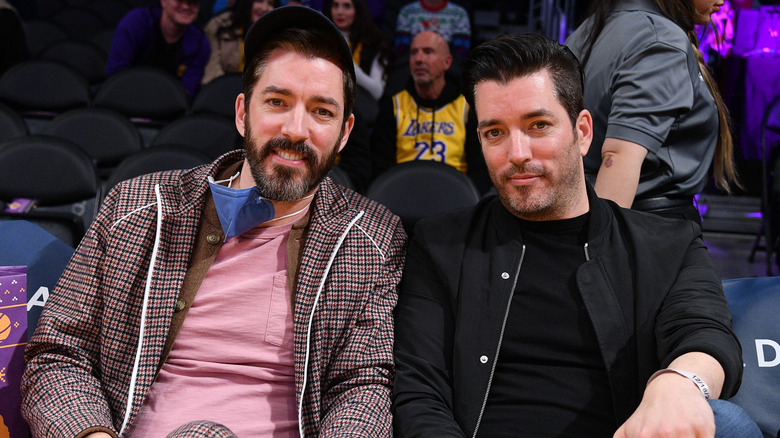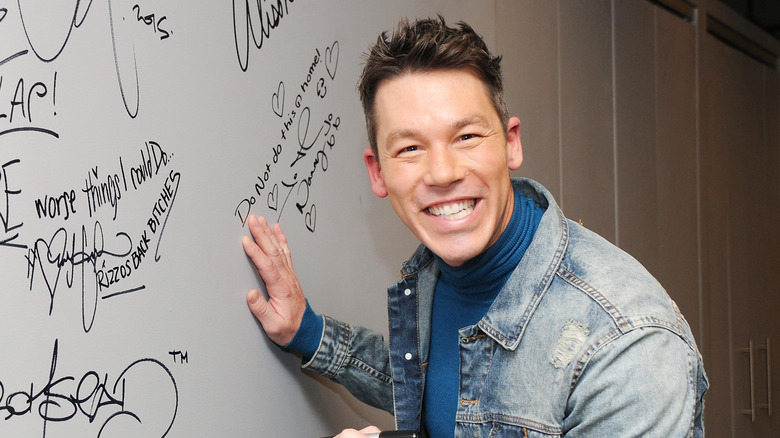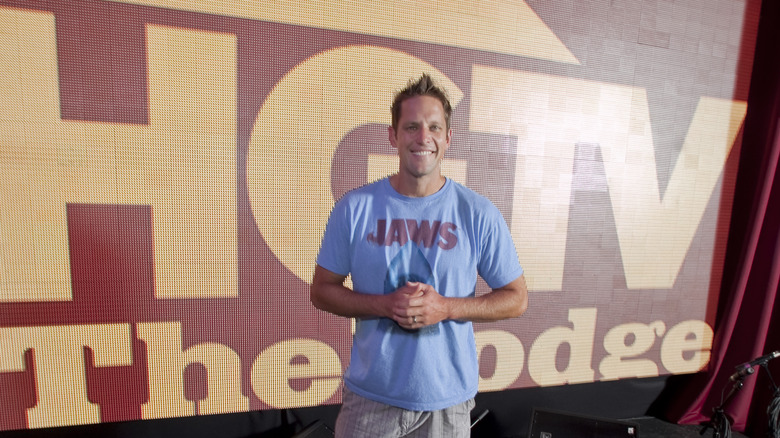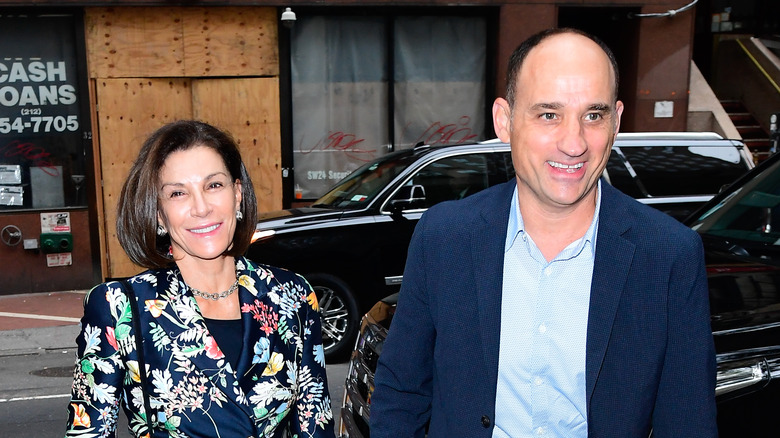10 Signs Your Favorite HGTV Shows Might Be Fake
Whether you're a "Flip or Flop" addict, "Love It or List It" devotee, or just someone who likes a little low-stakes drama, HGTV shows provide homeowners and home design lovers an outlet for their reno dreams. The network has been churning out lasting hits since its inception in 1994, driving views and seemingly a not-insignificant number of Home Depot sales. But as HGTV's popularity has skyrocketed, so too have rumors of staged situations, pre-written narratives, and other breaks with the reality of selling, buying, and renovating a home. Like most reality TV, it's certainly true that HGTV shows aren't always as neatly tied up as they might have you believe from one 30-minute episode. Some shows have even faced legal action over their less savory conduct.
Though some HGTV shows are genuine articles, others are too good to be true. Luckily, there are a few telltale signs of a show pulling the wool (or the rustic shiplap) over their viewer's eyes. Here's how to figure out if your favorite home flippers aren't the housing gurus they seem.
House Hunters participants say they're currently looking for a home
One clue that your favorite show is a little shady is comparing the average homebuying timeline to a show's usually less realistic framing. The blog Hooked on Houses confirmed some long-lasting rumors from the HGTV blogosphere regarding unrealistic homebuying narratives in the show "House Hunters." Bobi Jensen, a former "House Hunters" participant, spilled the tea to the now mostly defunct site in a guest post written in June 2012, describing the show producers shaping her family's story for their episode's 2006 taping.
The show did not choose to feature the Jensen family until they had fully closed on a new home — making their housing search during the show a total sham (and not the rug kind). "The ones we looked at weren't even for sale," Jensen said in her blog post. "They were just our two friends' houses who were nice enough to madly clean for days in preparation for the cameras!" In a follow-up interview with Entertainment Weekly, Jensen admitted that touring friends' homes wasn't standard practice for the show, but rather a bind specific to the Jensens' situation, as they could not find realtors willing to display a home for the show. A publicist for "House Hunters" further explained the choice to focus on home buyers who are further along in the process, stating that production schedules guided their decision to feature buyers who had effectively already chosen a home.
Property Brothers buys and renovates homes on an unrealistic timeline
Many HGTV shows feature home buying and renovations on nimble schedules, with homeowners seemingly entering refurbished homes within a couple of weeks (if that). That's a sign that your favorite show isn't necessarily showing all of its work. According to the Huffington Post, the average interior home renovation can take anywhere from two to six months, but the popular "Property Brothers" tend to show renovations wrapping up within a few weeks.
The Scott brothers have previously been upfront with the aspects of their show that are a little more flash than bang, revealing that the show utilizes scene reshoots, staged shots, and retakes of seemingly spontaneous events in their interview with The New York Times in 2017. But their fixes and renos are entirely real, according to them. Still, while they do ensure their clients' homes are habitable after renovation, only 3 or 4 rooms are typically finished and shown on "Property Brothers," owing to their tight production schedule. Clients have the option to have the brothers fully renovate their new home, but they may be paying a pretty penny for the extra work.
Fixer Upper doesn't let participants keep the furniture
Not all of the pristine interiors featured in renovation "after" shots are the clients' to keep, as it turns out. HGTV's super hit "Fixer Upper" made Chip and Joanna Gaines house-flipping superstars, but their stunning revamps aren't exactly truthful in their staging. The Gaines' rustic styling and furniture exclusive from Joanna's company Magnolia Home doesn't stay with the clients after the cameras stop rolling, according to Rachel Whyte, a participant in season 3 of "Fixer Upper."
Speaking to Country Living about her experience, Whyte said that the furniture isn't for keeps, as the clients typically have their own furniture that they will move into their new space. But starring on the show has some perks, as Whyte explained. If you want to keep some of the pieces, there's still a chance to do so after the show has wrapped. "They give you an itemized list of how much everything costs at the end to see if you want to purchase things at a discounted price," she said. It may not be the full Chip and Joanna makeover of your dreams, but it's likely better than the average interior decorating budget.
The Property Brothers are the only ones shown doing the work
Generally speaking, you can be assured that HGTV renovations are team efforts behind the scenes. In HGTV's hit "Property Brothers," Jonathan and Drew Scott are usually shown as the ringleaders of their whole operation. But while they may be the faces of the show, the brothers usually aren't the ones at the helm of either the home's acquisition or the renovation. Much like "House Hunters," the Scott brothers typically scout out clients who already have a home they'd like to purchase, showing them other available options alongside their original choice. Additionally, renovation extraordinaire Jonathan Scott is typically not the project's foreman — or even a primary worker.
In a comment to PopSugar, Jonathan explained that his work is typically on the design side of things, subbing in when the project calls for it. "I'm never laying 5,000 square feet of flooring," Jonathan admitted. "I have flooring companies, kitchen companies, and all of that jazz, but I can do and have done all of the work." The Scott brothers utilize local contractors and companies to their clients' area to complete the renovation, creating by their count roughly 150 jobs for tradespeople as they move from city to city. Although Jonathan Scott isn't the primary contractor for his clients, he's not afraid to get his hands dirty to cut costs, and he's even enlisted the homeowners' sweat equity to keep projects under budget.
The renovations have micro budgets – and no hidden costs
Some renovation shows purposely obscure their budgets, but others feature homes renovated at a fraction of the average price of an interior overhaul. Certain shows are a little more honest about what it takes financially to start an interior renovation or a full gut job, but many renovations have hidden costs, from the revelation of more systemic problems to the cost of supplies and labor outside of reality TV. According to a report from The New Yorker in 2021, many costs are disguised by discounted prices and deals exclusive to the hosts and producers, skewing the real cost of a kitchen, bathroom, or other renovation. Steve Ford, of the HGTV show "Home Again with the Fords," noted to the magazine that most participants "are getting more for their buck than they should" when it comes to an in-show versus real-life reno.
Still, other renovation masters like Jasmine Roth of "Help! I Wrecked My House" insist that the budgets are accurate. In an Instagram post, Roth noted that connections hosts make with other tradespeople can make the difference between an affordable build versus an expensive boondoggle. Regardless, she said, "I've never heard of a show that doesn't use the real numbers" (via Instagram).
My Lottery Dream Home participants aren't always looking for giant mansions
Like a lot of shows that feature big-ticket prizes, something that's "free" actually comes with a mile-long stack of paperwork and caveats. A lot of the participants on "My Lottery Dream Home" are canny enough to know that the taxes and fees associated with a million-dollar manse aren't worth the headache. Despite hyping up palatial estates, many lottery winners on the show prefer to sit on their savings, according to host David Bromstad. "It all depends on how much money they've just won," he revealed to the New York Post. While the show features real lottery winners, the homes they're shown don't always reflect their real budget, either.
Like many other HGTV shows, though, "Dream Home" frequently relies on participants who have already selected a property they'd like to purchase, making the decision process a little less dramatic than it might seem. One commenter revealed to Buzzfeed that an uncle who had appeared on the show had purchased the property well in advance of the show's taping. It's worth it, in the end, to spend some face time with Bromstad, however.
House Hunters and Property Brothers homes aren't actually listed for sale
Some participants on popular HGTV shows admit that the homes they toured aren't even listed for sale. It's a seemingly common tactic for shows featuring homebuyers deciding on a new home to feature participants who are in the final stages of a home-buying transaction. Given that the deck is a little stacked towards a particular home at the beginning, further embellishments are made when participants tour "prospective" homes.
On "Property Brothers," participants frequently tour an "inspiration home" meant to get the homeowners' creative juices flowing for their own renovation project. Meanwhile, on buy-and-sell-focused shows like "House Hunters" and "Designed to Sell," participants typically tour homes that they aren't likely to buy and that might not even be listed for sale at all. Notably, with "Designed to Sell," homeowners looking to stage their homes for sale might not be looking to put their homes on the market for several months, or, as one participant admitted to the Hooked on Houses blog, over a year. "Designed to Sell" even staged a fake open house for a home that wasn't yet on the market to provide a satisfying conclusion.
Yard Crashers select a random participant
If your favorite HGTV show relies on chance encounters and spontaneously chosen participants, chances are it's not exactly being honest. "Yard Crashers," a show featured on the HGTV-owned DIY Network, is probably the biggest culprit for pre-casting for seemingly random interactions. Producers would interview and screen between 15 and 20 people before deciding on their subject for that episode, staging their random encounter at a home goods store.
Prospective "Yard Crashers" participants must also meet a laundry list of other requirements before being cast, according to host Chris Lambton, including owning their own home. Ultimately, though, personality is key, as Lambton stated to PopSugar: "At the end of the day, I have to work with these people for two days. And they're long 12- to 15-hour days, so the biggest thing for me is that they have to be happy and goofy and make the experience fun." Maybe the chances of being cast are low, but it doesn't hurt to have a positive attitude when you're browsing through Home Depot, just in case.
Property Brothers and Love it Or List It have been sued by former participants
One surefire way you can tell things aren't quite as sunny as they're made out to be? Whether participants have taken out lawsuits against the shows after they've aired. "Love It or List It" got into serious hot water with a couple who claimed that the hosts' contractors saddled them with a shoddy renovation and a host of new problems as a result, according to the Miami Herald. Among the Raleigh couple's claims were allegations that the show's production company, Big Coat TV, and subcontractors did not use a licensed architect, and the funds used to renovate the home were misappropriated by the company. After a year of litigation, the property owners, Deena Murphy and Timothy Sullivan, ultimately settled with Big Coat TV for an undisclosed amount in 2017.
Legal troubles also plagued HGTV's famous twins, as the "Property Brothers" faced a lawsuit from a Las Vegas couple alleging unsatisfactory workmanship and a host of code violations. The couple, Mindy and Paul King, are currently suing for fraud, misrepresentation, and faulty workmanship in their kitchen renovation. While covering the Kings' lawsuit, reporters at KTNV Las Vegas uncovered an additional lawsuit against the show's production company, Cineflix, citing similar complaints, from breach of contract to a laundry list of repairs and damages. Both cases appear to be ongoing as of 2023.
House Hunters International encouraged a little conflict - and recast when necessary
If you noticed a lot of tension between couples featured on "House Hunters International," chances are, it's set dressing. In a 2019 article for Slate, writer Elizabeth Neucamp described her experiences being featured in the "House Hunters" franchise not once but twice. Neucamp pulled back the curtain on the home hunter side of the experience, revealing that participants will often discuss "storylines" with the producers and showrunners. It doesn't hurt to make things a little turbulent for the cameras, either. "We learned immediately that these shows are looking for conflict," Neucamp wrote, "so it's important to be ready to fight a little with your spouse." Neucamp admitted that this part was even a little fun for her and her husband, as they played up their home search for the sake of the story.
Nothing in reality TV is exactly real life, but that's not even the most phony thing about the international version of the "House Hunters" franchise, according to HuffPost. One couple whose home search was featured on the show didn't even end up being shown as participants. Instead, the older couple were recast as a younger, more attractive couple at the production company's behest.










